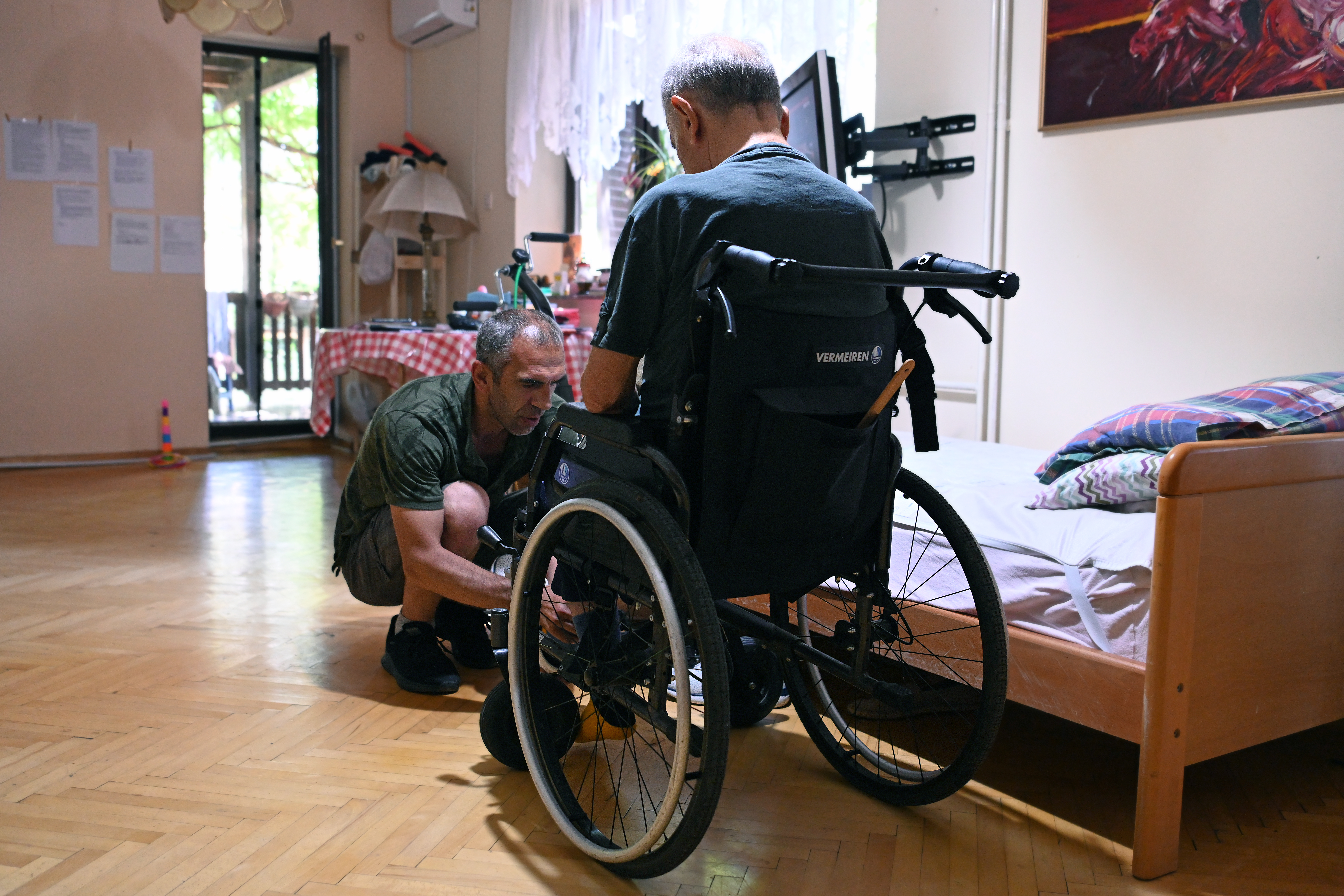The care economy: reshaping the social agenda in North Macedonia
November 15, 2023

Ljavdrim at work with a patient with disabilities.
Ljavdrim has a long history of experience taking care of people with disabilities. His father became disabled when Ljavdrim was only seven years old, so he had no other choice but to spend his childhood taking care of his parents. Life brought more experience when he became a parent himself. One of his daughters was diagnosed with cerebral palsy, and the other with epilepsy. “Ever since I can remember, I have wanted to help people,” Ljavdrim explains.
Ljavdrim has spent most of his life as a caregiver, a duty that often falls to family members, despite their experience or other responsibilities, and especially to women. Informal laborers often fill the gap for those without family members who can help. But the scope of caregivers’ work - providing services to different types of people in need, such as elderly, those with long term illnesses, people and children with disabilities and even people with specific illnesses or diagnose – is vast and important. Recognizing and redistributing unpaid work in this sector is long overdue, and North Macedonia is trying to reshape the social agenda when it comes to care work.
The care economy is still a predominantly women-dominated industry world widely. Nonetheless, the situation in North Macedonia is slowly changing, as the caregiving profession is becoming attractive for both genders and different ages. More than 30 percent of the caregivers are young people under the age of 30, and the percentage of women caregivers has slightly decreased from 90 to 85 percent. But there are still a significant number of unregistered or not-qualified caregivers.
Work to transform and reform the care economy have been one of the key areas of work for UNDP in North Macedonia for the past several years, especially after the COVID-19 pandemic. The pandemic deeply affected women participating in the formal labour market, unofficial care givers mostly stopped working and the increased numbers of those in need because of COVID-19 affected the quality of care. When a new model of social services delivery in the country was designed by UNDP in 2020, it included care work-related recommendations and activities.

Ljavdrim helps his patient.
Ljavdrim and his family come from a small mountain village. “My children’s illness forced my family to leave our village and move to another town to be closer to health facilities and react quickly when my girls need some medical intervention,” he explains. To feed his family, he worked as much as he could in various jobs as painter, tiler and wood and plastic collector. But what if he could find formal work doing what he had been doing all these years?
UNDP’s Care Economy Programme facilitates formal recognition for women and men engaged in caregiving within their families or informally. Participants who complete the training and acquire necessary skills can apply for a license at the Ministry of Labor, enabling them to work as service providers. Job placement opportunities are available within established NGOs or other organizations are providing social services in the caring sector.
When he heard about the program, Ljavdrim immediately applied. “I went through a three-month professional training in the company of social workers, medical personnel and educators, and I acquired a caregiver license,” he described. “Since then, I have a full-time job with a regular income, pension and health insurance. At the same time, now I take care of people who need a helping hand – professionally.” His eyes light up with pride and enthusiasm.

A training for care worker certification.
Ljavdrim now is a caregiver within the NGO Citizens Association RESURSEN CENTER for parents of children with disability. But he also works in an environment still influenced by stereotypes about gender-specific roles.
“Although many people think that caregiving is a woman’s job, I’m good and professional at my job,” he says proudly. “The people I take care of recognize this, and I have unreserved support from their families. There is no man or women job anymore… a job is a job and must be done!”
The program's objective is to address the skilled labor shortage of the country, especially in the realm of social protection and care, and support hard-to-employ citizens to find success on the job market. To date, over 300 women and men without any previous professional skills or formal education have obtained national recognized certificates. This makes it easier to find suitable employment as caregivers within various organizations and institutions providing social services.
Over 200 certified caregivers are now formally employed as caregivers at non-governmental organizations licensed as social providers. While many people, especially women, will continue to bear the burden of unrecognized care work in society, these efforts are the first step to formalizing this type of work in North Macedonia.
The Care Economy Program, launched in 2021 under the Operational Plan for Employment, is a collaborative effort between UNDP, the Ministry of Labor and Social Policy, and the Employment Service Agency.
Interested in this topic and in Istanbul? Join us 16 November for our screening of Through the Night, a look at a 24-hour day care centre.

 Locations
Locations



